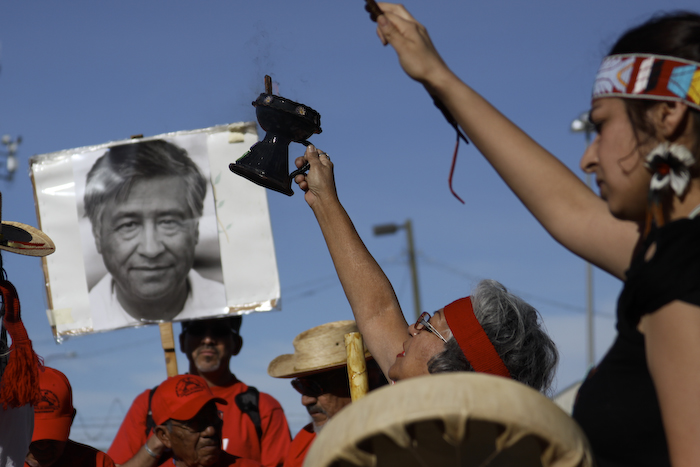EL PASO — The spring 2011 semester at the University of Texas at El Paso is one that should live on in the hearts and minds of the people who experienced it, for their entire lives.
It began with a simple exclamation by the president of the Student Government. César Chávez Day would no longer be celebrated on this campus in order to better facilitate the Campus’ schedule. This led to a series of student protests that culminated with Pete Duarte, CEO of Thomason Hospital and former director of Centro de Salud Familiar La Fe, returning his Golden Nugget alumni award to protest the holiday’s loss.
As this semester rolled along, I had many opportunities to explore the significance of César Chávez Day. To begin with, I took Prof. David Smith-Soto’s class in Applied Interactive Magazine, which led me to write several articles for Borderzine.com. Two of my articles “18 years after his death, Cesar Chavez still battles in the Texas Legislature” and “With poverty still a way of life, Segundo Barrio remembers César Chávez,” I explored the debate behind the celebration of the event in two ways: first through the correspondence between UTEP and Texas State Representative Roberto A. Alonzo and second through the eyes of the residents of Segundo Barrio; one of El Paso’s most historic communities, who had no doubt in their minds that this event should be celebrated.
In addition to the stories I wrote, I also was exposed to the issues surrounding this event when in my “Chicana Studies” course, taught by Dr. Marion Rohrleitner, I was given the opportunity to read the novel Under the Feet of Jesus by author Helena Maria Viramontes. The novel depicts the plight of farm workers in the late 1980s, several years after Chávez’s time. The protagonists of the story still live in abject poverty, are treated as slaves by plantation owners and die painful deaths due to exposure to pesticides. Their struggle as documented by the author shows a plight that indicates nothing at all has changed since Chávez’s time.

César Chávez celebration at El Paso, March 31 2011. (Raymundo Aguirre/Borderzine.com)
I later verified that assumption when I attended the premiere of the work in progress film César’s Last Fast at UTEP’s Union Cinema. The film, which was brought to the campus by director Richard Ray Perez in light of the protests, contrasts the plight of the migrant farmworkers in Chavez’s time to those in modern times. In modern times, migrant workers must pick with great speed and exhaustion to secure a certain amount of bushels for the plantation owner or risk not getting paid. United Farm Workers work alongside the plantation workers to secure their fair wages, still struggle to unite farm workers under the union, for fear they may lose the jobs they still greatly depend on.
Thanks to the hard work and tenacity of UTEP’s Chicano-based student organizations, and the efforts of people like Pete Duarte, ultimately the day was won. César Chávez Day was reinstated as a holiday on campus for this semester. Still, the battle was far from over, as UTEP’s Chicano Studies Director Dr. Dennis Bixler-Marquez went on record as saying the decision was a ”quick bandage” for the problem, and more would have to be done if the holiday would be preserved for future generations of UTEP students to appreciate.
Additionally, the holiday itself has become endangered on both this and other campuses as our leaders in the Texas House of Representatives seek to pass House Bill 505, which will effectively remove César Chávez Day as a holiday, replacing it with the more non-specific “Texas Spanish Heritage Day.” If such an act is allowed to happen, the name of César Chávez will be stricken from the public consciousness, as it had been from the textbooks of our children in the past.
Looking back upon the semester and learning all that I have learned about both César Chávez, and the ongoing plight of migrant farm workers in America, it is clear to me when professors like Dr. Bixler-Marquez, and Texas House representatives like Roberto R. Alonzo say that our work is not yet done. Our lives are still lived on the backs of the campesino, and there are still those who seek to erase the great achievement César Chávez worked for. The injustices that Chávez hoped to change in his time are still alive and well in ours.
And if the idea of that makes you angry, then you should do what you can to help the effort.
For starters, everyone who reads this article should log on to Facebook and “Like” the fan page for the film César’s Last Fast. The film still has a long way to go before it is nationally released and it needs all of the support it can possibly get. Director Perez has requested everyone who has seen the film in progress and seen the clips on the website to follow the film and see if an opportunity will arise to help it gain national attention.
In addition to that, you should read Viramontes’ book, and keep your eye on César Chávez related stories on Borderzine. If you’re still a student, you should consider joining an organization like MEChA, and become involved in student government. That way, when the next spring semester rolls around, UTEP will not be threatened with the abolition of César Chávez Day once again.
Don’t allow yourself to get into the mindset that this holiday is not important. It is, when people who still work in the fields picking grapes still depend on the support that the United Farm Workers give. Don’t let yourself think that this holiday isn’t celebrated, when El Paso residents of Segundo Barrio still celebrate it every year. But most importantly, do not forget. Do not forget how hard we have worked to preserve the holiday on this campus, and do not forget that it is students like you that made such an undertaking possible.

